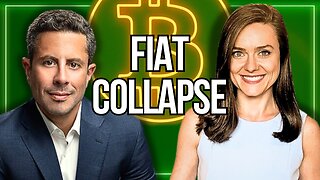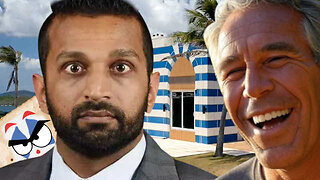Premium Only Content

Expose Deceptive Lies.
A definition of lying:
Lying means telling another person something the we believe to be false, with the intention of making the other person believe that this statement is true.
According to this definition:
There must be another person to which one is telling the lie;
The speaker must believe that they are saying something that is not true;
There must be an intention to deceive the other person.
These are important considerations, because, for example, if the speaker says something that is not true, but they do believe it to be true, then they are not telling a lie. Your friend who thinks that he has been visited by aliens in his sleep last week is not lying to you, if he really believes that the aliens came for him.
A little more tricky is the last requirement: The liar must have the intention of making the other person believe that the statement is true.
Is a movie about James Bond a lie? Although it depicts events that never happened and the people who made it also knew very well that 007 is fictional, we would not say that the filmmakers are lying to us. This is because we all know that this is a fictional story. The filmmakers do not try to sell it as a documentary of real events. They intend to entertain the audience, not to deceive them into believing that James Bond exists.
On the other hand, a “documentary” about aliens that tries to convince the viewer of their existence by faking photographs and dressing up children in aluminium foil does constitute a deception. The aim of the filmmakers in this case is to deceive the viewer.
Lying means telling another person something the we believe to be false, with the intention of making the other person believe that this statement is true. Tweet!
Lying and deception
Deception is a wider concept than lying.
To deceive means to cause someone to believe something that the deceiver believes to be false.
Deception, as opposed to lying, is not restricted to statements. I can deceive someone by planting fake evidence, for example. Or I can deceive by doing nothing. A real estate agent who knows that the government is planning to build a highway close to a house and does not tell the buyer about it, is deceiving the buyer without actually doing anything.
To deceive means to cause someone to believe something that the deceiver believes to be false. Tweet!
When is lying permissible?
Lying and deception may sometimes be morally permissible. Different moral theories have different opinions on this.
Utilitarianism would say that an action is permissible if the sum of the benefit it creates is greater than the sum of harm. Sometimes, lying or deception can be more beneficial than harmful: for example, if you deceive a burglar into believing that your house is protected by installing fake security cameras on the outside, then this is clearly a permissible deception.
“White lies” are another permissible form of lie. If you don’t want to visit your colleague this afternoon, you might tell them that you have another appointment, instead of telling them directly that you are bored in their company. In these cases, telling the truth would be more harmful than lying.
Kantian ethics (named after philosopher Immanuel Kant, 1724-1804) emphasises that we should always act rationally. This means that we should not choose actions that would become impossible or meaningless if everyone performed them. Lying, in any form and for any purpose, is such an action. Lying only works when everyone generally tends to tell the truth. If all people were lying, then nobody would believe anything they are told, and then lying would make no sense: lying is self-defeating.
Also, Kant says that we should treat other people as ends, meaning that we should always consider their wishes and choices and take them seriously, rather than merely using others for our own goals.
In the case of the white lie, I would have to consider whether the person I’m lying to would actually prefer to know the truth. It is not entirely clear whether my colleague, whom I don’t want to meet, might prefer to be deceived about whether I like to meet them or not. In the case of the burglar, it seems clear that he would prefer to know the truth about my fake cameras, so that he can go on with his business and break into my house. But there’s a catch: the burglar himself is not treating me as an end in the first place. He is not respecting my wish to not be his victim. Therefore, he is the one who is first violating Kant’s ethics by trying to rob my house. And therefore, I am justified in preventing this immoral action against me.
Kant’s Ethics: What is a Categorical Imperative?
Recommended for you:
Kant’s Ethics: What is a Categorical Imperative?
Kant’s ethics is based on the value of one’s motivation and two so-called Categorical Imperatives, or general rules that must apply to every action.
For Aristotle’s virtue ethics, lying is clearly not a virtue; honesty is. But things are more complex. Overdoing honesty to the point where it becomes harmful to the honest person as well as to others is not a good course of action either. So Aristotle would not say that I have to tell the burglar that my cameras are fake. All things considered, by deceiving the burglar, I have reached a situation where I am not less virtuous (since protecting oneself from immoral actions is not a lack of virtue), and I also prevented the burglar from doing something bad. In a sense, I have promoted the virtuous choice of the burglar by scaring him off. Whether this would apply to other lies and deception can, according to Aristotle, be judged only separately for each individual case. Aristotelian ethics does not provide general and abstract rules of conduct, but emphasises that the agent will have to evaluate every situation using their best ability, utilising their knowledge, experience and judgement. The overarching goal is always to be a virtuous person, rather than, say, to benefit oneself at the cost of others.
For example, I might be poor and not have enough to eat and to feed my child at the same time. So I might give the last food I have to my child. If the child asks me if I am not hungry myself, I might lie and say that I have already eaten. In this case, my lie is an expression of a virtuous and noble state of mind and virtue ethics would probably not object to it.
-
 7:12
7:12
New York Post Sports
11 hours agoYankees ready to renew their rivalry with Red Sox in the Bronx
1 -
 14:03
14:03
Clownfish TV
12 hours agoBlack Panther is WHITE and Bluesky is BIG MAD!
5699 -
 1:05:10
1:05:10
Dad Dojo Podcast
10 days agoEP34: WHEN IS IT OK TO TREAT YOURSELF?
50 -
 10:55
10:55
Cooking with Gruel
10 days agoSimple Salmon with Kimchi Sauce
3.12K -
 26:21
26:21
RoxomTV
1 day ago🔥 Saifedean Exposes the Fiat Scam — Bitcoin Is the Only Way Out 💰💀 | Roxom Exclusive
4.22K1 -
 1:58:08
1:58:08
Badlands Media
11 hours agoThe Liberty Den Ep. 145: Trump Traps, Vaccine Fallout & the Weaponization of Law
103K49 -
 DVR
DVR
SpartakusLIVE
9 hours agoVerdansk EASTER EGG, Specialist ALL NIGHT || Duos w/ @GloryJean followed by Quads w/ The Boys
79.8K4 -
 2:52:39
2:52:39
GamerGril
3 hours agoThank God It's FrightDay | Killing Floor 2 | Ft. SilverGsuit
9.65K4 -
 2:23:56
2:23:56
TheSaltyCracker
7 hours agoKash Makes it Worse ReeEEeeStream 06-07-25
106K285 -
 37:48
37:48
Iggy Azalea
4 hours ago $8.43 earnedIggy's BDay Stream
20.9K13